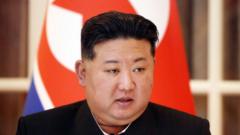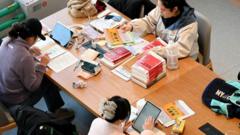In the face of China's transformative era, Han Song's works resemble precursors to actual events, reinforcing the idea that fiction sometimes forecasts chilling truths about society's trajectory.
The Prophetic Pen: Han Song’s Dystopian Visions Become Reality

The Prophetic Pen: Han Song’s Dystopian Visions Become Reality
Explore how Han Song, a science fiction author, reflects the unsettling realities of modern China through his prescient narratives.
In the realm of science fiction, few writers navigate the complexities and unpredictability of reality like Han Song, a luminary in China's literary landscape. As he crafts narratives filled with foreboding imagery and prescient ideas, the juxtaposition of his fictions with actual events blurs the line between imagined futures and recent history.
Han, now 59, has had a prolific career spanning four decades. His writings foretell scenarios that have not only echoed through time but have also materialized in disconcerting forms. One of his notable works, penned in 2000, depicted a horrifying world where the World Trade Center met its catastrophic fate, long before it became a tragic reality on 9/11. Furthermore, in 2016, he authored a compelling tale wherein the globe morphed into an immense hospital complex, an eerie reflection of the draconian measures enforced during the COVID-19 pandemic.
The dystopian themes in Han's fiction exemplify his belief that the world can morph into terrains far darker than he ever anticipated. “I thought I was just writing, but that it was impossible for it to happen,” Han remarked regarding his pandemic-themed narrative, “Hospital.” The ironic twist in his journey emphasizes an essential truth: real life often outstrips the imagination of fiction.
His stories serve as a lens through which to view the growing divide between China and the West and the shifting power dynamics on the global stage. In his short story “The Passengers and the Creator,” he presents a chilling picture of Chinese citizens venerating a cryptic deity — Boeing, which represents the existential faith in technological marvels. Other tales immerse readers in commonplace environments, transforming them into scenes of grotesquerie, as characters engage in cannibalism or widespread debauchery in the unlikeliest of places.
As a journalist for China's state news, Han documents the rapid modernization of his country by day. Yet, by night, he invokes a darker side of this evolution, exploring existential dislocation and alienation. His narratives not only question the ethos of progress but reveal the haunting specter of what the future might hold, reminding us all that the unthinkable, at times, may merely be a few steps away from reality.



















